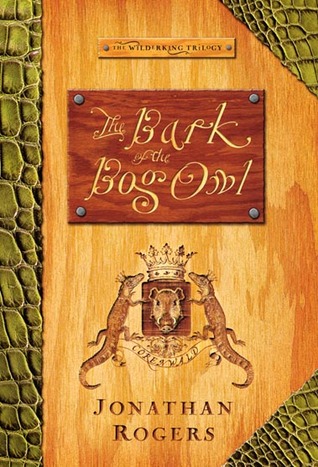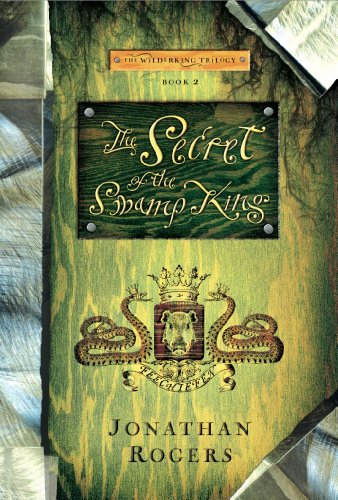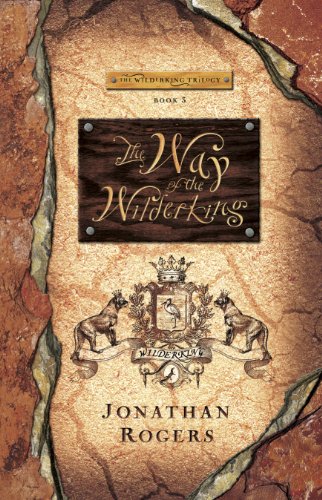This spring my family fell in love with The Wilderking trilogy. Much like Narnia or the Shire, the Wilderking books are set in a place that feels romantic and a bit heaven-kissed. Corenwald is a place of physical beauty, vibrant community, traditional values, exotic intrigue, relative peace, and the possibility of high adventure. The fictional island nation was built by freedom-seeking pioneers who wanted a land in which peace would prosper and life would remain mostly unchanging. Corenwald is a place I missed immediately after, and continue to miss, now that I have finished reading the story.
Whenever an Amazon reviewer compares a new book to the writings of J.R.R. Tolkien or C.S. Lewis, Diane and I groan. Why does everybody want to write the next Narnia? Why does anybody think that they can write the next Lord of the Rings? Despite my affection for new books from living authors, I am reticent to make comparisons between Narnia or The Hobbit and almost anything that came after them. To my mind, those stories accomplished something that practically no one else has and almost no one else will. J.R.R. Tolkien and C.S. Lewis embraced the emerging genre of fantasy and elevated it. They took the magical beauty of George MacDonald’s stories, the delightful antics of Edith Nesbit’s best tales, the rich traditions of the great epics, and their own delightful imaginings, and melded them into new stories that have timeless souls. After years of investing in their own classical education, Lewis and Tolkien honed their writing craftsmanship, and bestowed upon the English language beautiful new stories that celebrate ancient Western ideals.
Not dissimilar to those genre-defining classics, I am absolutely certain that the Wilderking books are a sample of excellent literature and have the potential to be appreciated as a Junoesque evolution of the genre. Whether or not the Wilderking books will be as beloved as The Chronicles of Narnia, I cannot say. But I can say that audiences who appreciate the sublime sincerity and creative elegance of Narnia and The Hobbit are likely to also appreciate The Wilderking Trilogy.
Writers are encouraged to write what they know. Rogers is a Southerner, a Bible-loving Christian, a lover of classical literature, and clearly a devotee of Lewis, Chesterton, MacDonald and other greats. If ever there was a recipe for an American-flavored fantasy author of lasting value, the requisite ingredients are all to be found in Jonathan Rogers.
In The Wilderking trilogy, Rogers takes the story of King David and tells it anew. Without changing the spirit of David’s miraculous story, Rogers re-contextualizes it. He changes the location to something that looks a lot like Southern Georgia. He changes the time to something that resembles the Middle Ages. He changes the story of the Israelites to something that echoes the story of Colonial America. And, he changes the cast of characters to include an almost mythical race of people who live entirely in the swamps. Without being slapstick, without feeling forced, and without diminishing the way that God works His will in the human story, Rogers tells an entirely new story that feels deliciously familiar. Also, he tells it in such a way that he helps his readers to imagine the Bible as being relevant for all ages and in all places. The storytelling is nothing short of inspired. To boot, Rogers has a Ph. D. in seventeenth-century literature from Vanderbilt University, which is kenspeckle in the beauty of his writing.

In this article, I reviewed the first book in the trilogy, The Bark of the Bog Owl. **Now available at Audible!

In the second book, The Secret of the Swamp King, we have a classic middle book. Many folks dislike “middle books” because they advance the plot and deepen the characters without giving us the excitement of a first book nor the resolve we crave from a third book. I contest that Rogers did something special in this middle book to alleviate some of the “middleness.” Instead of just advancing the plot, Rogers removes Aidan from the court of Corenwald and focuses the entire second book on the Feechie culture and swamp living. In this book we see a new side to Aidan. I think my family enjoyed it the most of the three books. This journey into the depths of Feechie life was magical. For my two sons in particular, the swamp life fed their imagination with a new, primal, and earthy way of life to contemplate. It gave all of us a new respect for simple honest living.
Without spoiling the second book, I will say that my favorite scene from all three books comes in the last third of this middle book. When a false Wilderking emerges and organizes some “bad” Feechies into a brood, Aidan must deal with the imposter. With the clash of war on all sides, Aidan stands erect and walks with purpose and intensity into the middle of the mess. Almost like a slow motion hero moment in a big-budget movie, Aidan walks through the violent brawl without any thought of his own safety. As he walks, he yells out his challenge to his enemy and the crowd begins to turn its focus on this pivotal scene. I won’t spoil what happens, or why, but in that scene, the boy Aidan is replaced with an epic hero worthy of propelling the story forward. Through this intense show of strength, Aidan shows the greatest kind of strength. Again, no spoilers, just know that it is biblical strength that this Wilderking commands.
“Aidan noticed a new light in the Bearhouse feechies’ eyes. The old, fiery feechie spirit had chased away the dullness born of overwork and a love of cold-shiny. Their swampy exuberance made them more formidable enemies than their flashing weapons ever could.” – The Secret of the Swamp King

In the third book, The Way of the Wilderking, Rogers integrates the first two stories into one new reality. While a new, stronger, and more confident Aidan emerges from the swamp, the shepherd boy is still in him as well. More importantly, his friendship with the King’s son is still precious to him. And no matter how unhinged the King has become, Aidan and his family remain loyal subjects. The entire third book can be understood as a tension between two goods. Two rights. Two bests. Discerning how to strike the balance, while the king sinks into an unrelenting dark and dangerous depression requires everything Aidan and his friends are capable of commanding.
“Father is a man of faith. That’s why he can sleep on a night like this. He prayed for an hour or more this morning, just like every morning, while you were still snoring. He prayed for you by name, in fact, Marvin. I heard him. Father’s been praying all day. And now he’s resting in the mercy of the living God.” – The Way of the Wilderking
It is really tricky to talk about the third book without spoiling it. Suffice to say, it ends extremely well. In fact, my kids and I read the last third of it in one day, because we had to know how it ended. And everything that happened was a surprise while none of it was a surprise. Somehow, Rogers was able to take the foregone outcomes that we know so well and present them in unexpected and deeply satisfying ways.
One of the great tensions in the third book is the triangular relationship between King Darrow, Prince Steren, and Aidan. I think that many of us who have studied the story of David have been struck with great sadness over the death of Jonathan. Saul’s unwillingness to live in the grace he had been given ruined not just his own life, but that of his son’s as well. Perhaps Rogers shares my regret over Jonathan’s demise. The way in which he writes the character of Prince Steren gives us something noble and exciting to love. The way that Steren loves both his father and his friend is beautiful. In this story, we know that Steren cannot survive to the end because we know that Jonathan did not. But instead of being a mere casualty of his father’s wickedness, he is a hero. In some ways, this is almost harder. In Steren, we see what King Darrow robbed his people of; a king who would have been worthy indeed if his father’s sins had not cut him down.
I think the genius of the Wilderking books is that they allows us to bring our knowledge of the Bible into a different setting. Instead of miraculous events which took place thousands of years ago in a foreign desert, they feel much more familiar. They feel like they could have been a part of our American story. This story is not a true allegory. Not everything represents something. It is, however, an exciting and relatable reimagining of one of God’s greatest stories. This reimagining, which is informed by the Bible, but grown out of Rogers own creativity, enhances a delightful boy adventure story. This excellent story is elevated by the biblical truths it incorporates.
Read by the author, it is available at Audible!
If you are looking for more from Jonathan Rogers, check out our review of his biography of Flannery O’Connor, The Terrible Speed of Mercy.
5 Comments
Comments are closed.